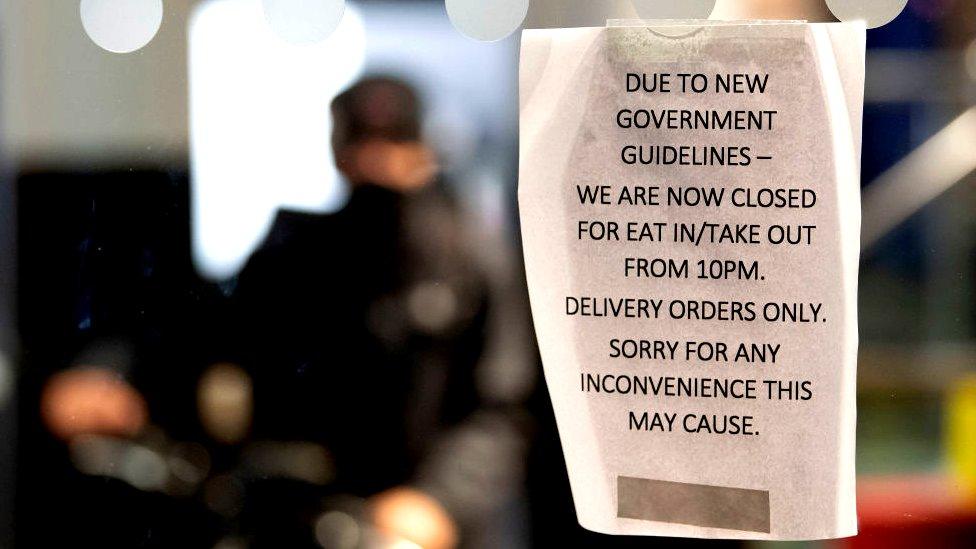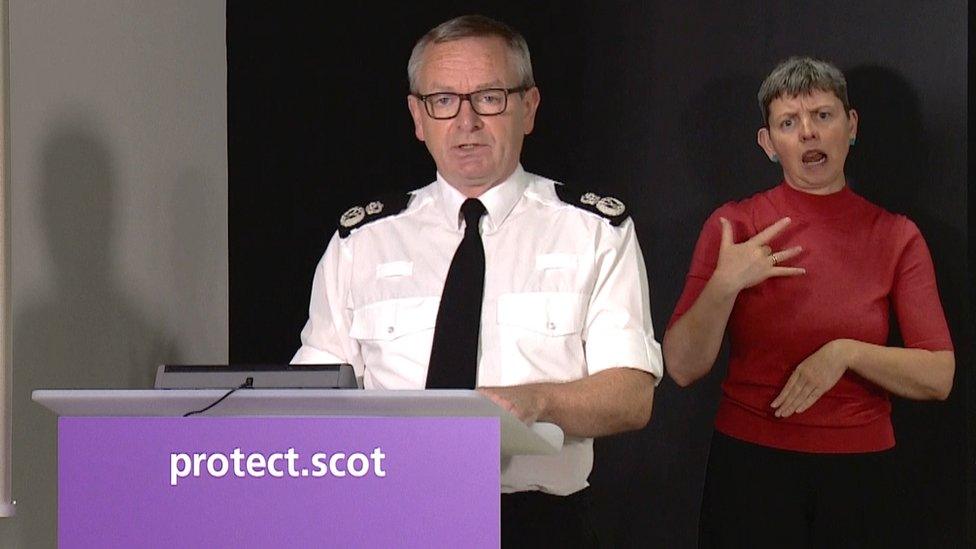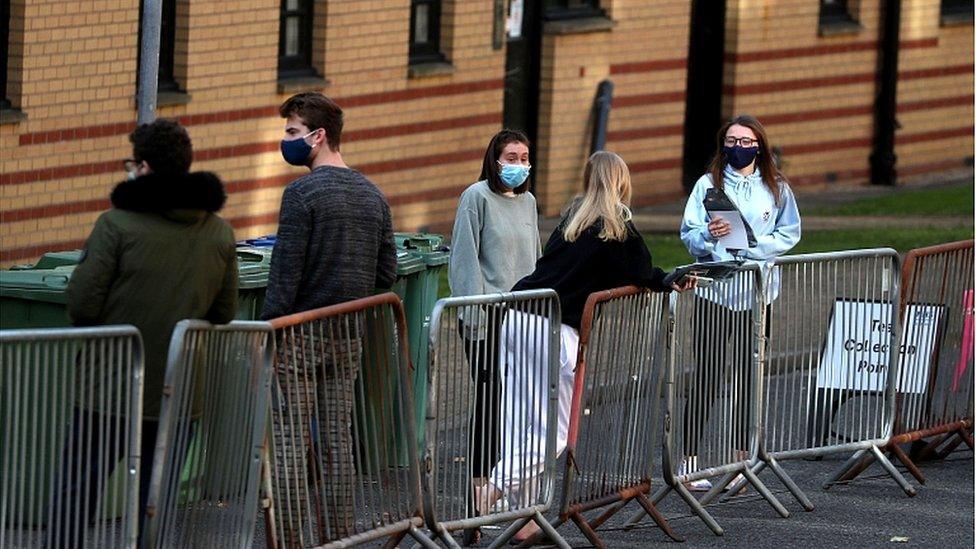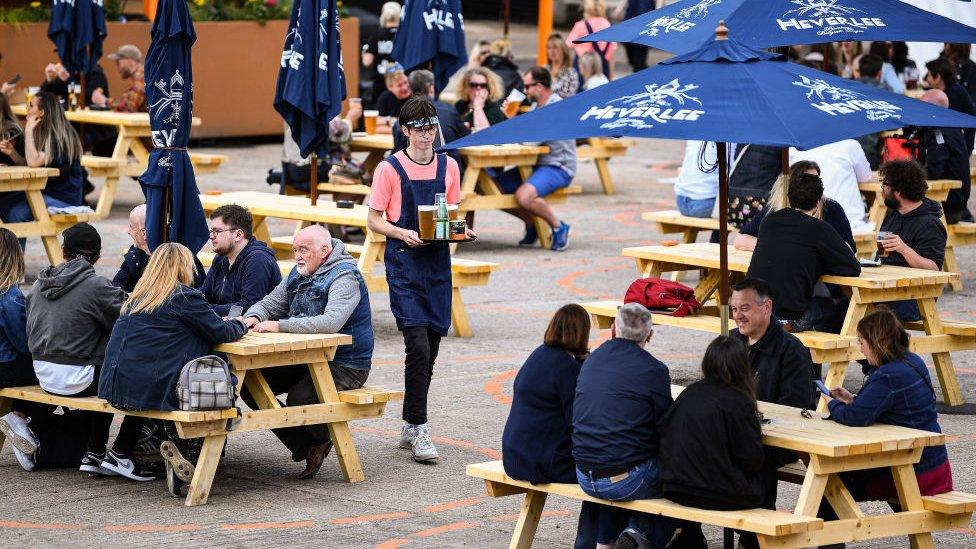Covid: Extra police patrols as bar curfew begins
- Published

A sign on a pub window warns customers of the curfew
Police patrols have been stepped up across Scotland to ensure the smooth introduction of a new pub and restaurant curfew.
All hospitality must now close at 22:00 in the latest raft of measures designed to halt Covid transmission.
Scotland's chief constable promised extra policing as he urged citizens to act responsibly.
He also issued a blunt warning that organising, hosting or attending house parties was now breaking the law.
The Scottish government has revealed that 36% of positive cases handled by Test and Protect mention social exposure, through hospitality or socialising with friends and family.
It said the aim of the measures was to reduce the amount of time people can spend in licensed premises and therefore curtail the spread of the virus in high risk environments while still allowing businesses to trade.
'Challenging period'
Soaring infection rates have prompted the introduction of strict measures on the hospitality industry across the UK.
Every pub has been ordered to observe the 22:00 curfew, with the threat of permanent closure for those who do not comply.
Chief Constable Iain Livingstone from Police Scotland said extra patrols would be deployed around closing time to ensure the change was being adhered to.
At Friday's Scottish government coronavirus briefing he said: "Additional officers will be deployed across Scotland to support colleagues from local authorities and to monitor compliance.
"I think it's important for me to say that the vast majority of licensees have acted with great responsibility during this very challenging period - I pay credit to them and undertake that policing will continue to support and work with the licensed trade."

Chief Constable Iain Livingstone warned people that house parties were now illegal
He said that officers would "continue to use good sense" when enforcing the new rules.
He also issued a stark warning over the temptation to spill from the pub to a gathering within a house.
The chief constable admitted that the curfew could see an increase in house parties or gatherings as customers refused to end their nights early.
But he made it clear this would not be tolerated.
He said: "During this extraordinary time where people's freedoms, liberty and family relationships are subject to restrictions never seen before, it is right and proper that the police service looks to engage with people, explain what is required of them.
"If they refuse to do what their fellow citizens, their neighbours are doing, we will take enforcement action.
"What is absolutely clear is that house parties and house gatherings are not permitted under any circumstances, there can be no excuse for arranging or attending a house party.
"You must not organise, host or attend a house party or house gathering, it is against the law."
Student restrictions
With local "September weekend" public holidays in many areas, the curfew marks one of a set of increased measures introduced to combat the rise of new infections.
On Friday there were 558 new positive cases of coronavirus reported in Scotland since in the previous 24 hours - the highest daily total since the outbreak began.
Of these, 255 were in Greater Glasgow and Clyde, where there has been a significant outbreak at University of Glasgow student accommodation

Students were ordered to quarantine and stay away from pubs after an outbreak at Glasgow University's Murano Halls
Students at all Scottish universities have been told not to visit hospitality venues this weekend and Universities Scotland said students who go to parties or socialise with anyone outside their accommodation risks losing their place at university., external
Universities will adopt a "yellow card/red card" approach to breaches of discipline, with students warned the consequences could include "potential discontinuation of study".
First Minister Nicola Sturgeon said she sympathised with students and she hoped disciplinary action would only be taken as a "last resort" against those who "flagrantly" broke the rules.
Social settings
The Scottish government also said it appreciated how difficult it was for pubs and other hospitality outlets, but that restrictions were based on the fundamental need to reduce transmissions.
A spokeswoman said: "Recent management information from our Covid-19 case management system suggests that around 36% of cases mention social/recreational exposure, including hospitality or socialising with friends/family.
"Although this data has many caveats and limitations, and therefore cannot prove causality in terms of where transmission has taken place, it does help guide our response to help prevent transmission in such settings."
The hospitality curfew comes a week after the "rule of six" came into effect in Scotland, limiting all gatherings, including those in pubs and restaurants, to no more than six adults from two households.
Venues are also forbidden from playing background music, must enforce strict rules on hygiene and distancing, and record customers' details for track and trace data.
Hospitality industry organisations said the latest restrictions were a "potentially fatal blow" for many business.
Indoor visits between households are also banned across Scotland for the foreseeable future until the risk of transmission is reduced.



Are you a student in lockdown? Share your experiences by emailing haveyoursay@bbc.co.uk, external.
Please include a contact number if you are willing to speak to a BBC journalist. You can also get in touch in the following ways:
WhatsApp: +44 7756 165803
Tweet: @BBC_HaveYourSay, external
Please read our terms & conditions and privacy policy
If you are reading this page and can't see the form you will need to visit the mobile version of the BBC website to submit your question or comment or you can email us at HaveYourSay@bbc.co.uk, external. Please include your name, age and location with any submission.
- Published25 September 2020

- Published23 September 2020
